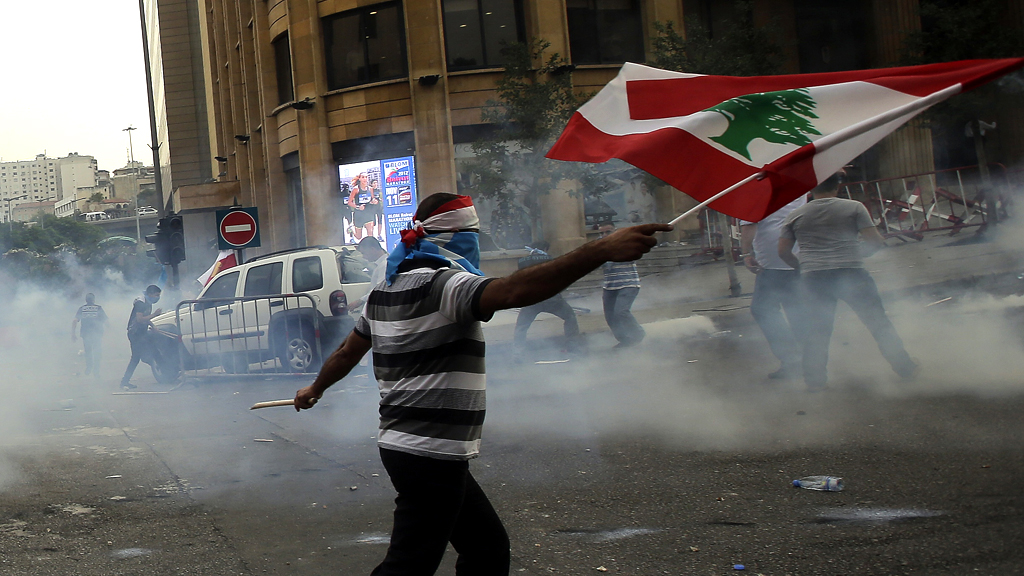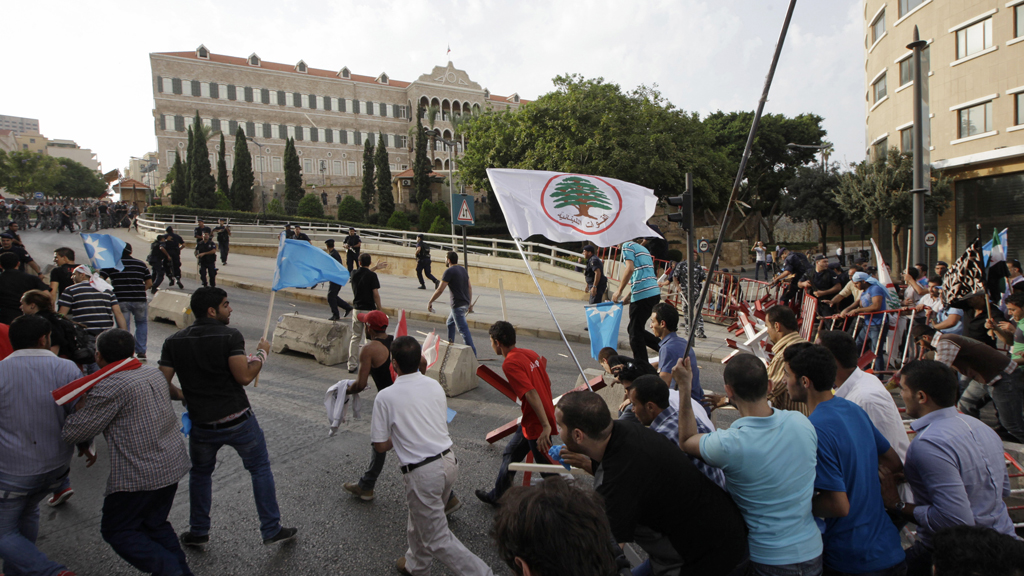Violence follows funeral of official in Lebanon
As violence breaks out at the funeral of assassinated top intelligence chief Wissam al-Hassan, Beirut journalist Dalila Mahdawi reports on why protesters are calling for the PM’s resignation.
Mourners had gathered in Beirut’s central Martyrs’ Square district [photo below] when hundreds of protestors broke away and attempted to storm the offices of Lebanese Prime Minister Najib Mikati at the Grand Serail.
Soldiers fired bullets into the air and used tear gas in an effort to disperse the mob.
Security personnel quickly established a security cordon around the building as opposition leader and former prime minister Saad Hariri pleaded for calm, saying: “We are not advocates of violence and I call on all supporters to leave the streets immediately.”
Gerenal Wissam al-Hassan, who headed the controversial intelligence branch of the internal security forces, was killed along with seven others in a massive car bomb on Friday. He was a strong opponent of the Syrian government and was known for his close ties to the former Prime Minister Rafik Hariri, who was assassinated in 2005, and Hariri’s Future Movement party.
His death on Friday, which occurred as many parents were collecting their children from school, has largely been blamed on Syria. Damascus has rejected involvement, calling Hassan’s killing a “cowardly” act.
Prime Minister Najib Mikati, who many politicians are demanding resign over the killing, arrived to the funeral to a chorus of angry boos from the crowd of around 3,000 people.
Many protestors waved flags in Arabic, English and French calling for Mikati to step down. One read: “Get the Syrian out of the Serail [government],” in reference to what many Lebanese see as Mikati’s close links to the Syrian regime.
The clashes appeared to have been contained before long, but there are reports that violence has spread across Lebanon, with protestors burning tyres and shooting guns in Tripoli and other areas of Beirut.

The man who knew too much?
Dubbed by one local newspaper as “the man who knew too much,” Hassan had been an investigator with the Special Tribunal for Lebanon, the international court tasked with prosecuting Hariri’s assassins and which last year indicted four men with ties to Hezbollah and the Syrian government.
Earlier this summer, he had uncovered a plot by former information minister Michel Samaha to commit terrorist attacks against high-profile Lebanese figures.
“He was privy to a lot of highly confidential information that was dangerous to many people, so he had to be eliminated,” said Karim Makdessi, an associate professor of politics at the American University of Beirut.
He was targeted as he passed through a side street off Sassine Square, a busy area in Beirut’s Christian neighborhood of Achrafieh.
“We came today out of recognition for a man who died trying to protect all of the Lebanese people,” said Adil, 64. “We are embedded in a regional conflict in which the Lebanese people have no control over their destiny. It is the duty of all patriots to join hands and unite to prevent a civil war.”
Political upheaval
Mikati is part of the dominant March 8 coalition, formed of Hezbollah and its Christian and Muslim allies and backed by Syria and Iran. He tendered his resignation on Saturday but President Michel Sleiman rejected the move, saying his departure would lead the country into further crisis.
Professor Makdessi said that the opposition March 14 bloc would now try to cash in on popular anger at Hassan’s assassination in order to reassert their weakened position in government.
March 14, a coalition of pro-Western Christian and Muslim parties led by the Future Movement, has played a muted role in Lebanese politics in recent years.
“Now is the time for mourning and for coming together to create a proper national security and political agenda for the whole country. It is not the time to point fingers or to assert parochial, sectarian agendas,” said Professor Makdissi.
‘I don’t feel safe’
But many see Hassan’s assassination as the beginning of a renewed campaign against anti-Syrian figures. Between 2005 and 2008, there were 11 assassinations or attempted assassinations in Lebanon. All of the targets were politicians or journalists vocally opposed to the Syrian regime of Bashar al-Assad.
“I don’t feel safe at all now,” said Zeina, 30. “There are only going to be more political assassinations and all of us ordinary Lebanese are going to stuck in the middle of it all again.”
Simon Haddad, a Lebanese political analyst, said that while a number of other senior Lebanese officials were now possible assassination targets, it was more likely that the diplomatic repercussions of Hassan’s death would play out in Syria.
“His killing will have more implications for the Syrian crisis more than on Lebanon,” he said. “The Arab countries will start seriously to support the rebels with weapons.”
Dalila Mahdawi is a British journalist based in Beirut.

-
Latest news
-
Scarlett Johansson ‘shocked’ and ‘angered’ claiming ChatGPT ‘imitated’ her voice3m

-
One-punch deaths: parents help son’s killer turn life around5m

-
Dirty rivers: Ruben Reuter challenges water minister8m

-
UK economy: when will the interest rate fall?3m

-
Ex-Post Office company secretary questioned over Horizon scandal5m

-




